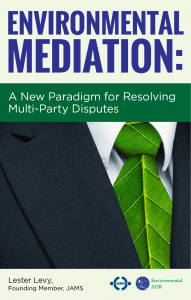 Some of you may already have seen a copy of my new ebook, in which I propose a new paradigm for resolving complex, multi-party environmental disputes. It relies on mediation — not as it has been compromised and incorporated into standard litigation procedures — but as a true and superior alternative to litigation.
Some of you may already have seen a copy of my new ebook, in which I propose a new paradigm for resolving complex, multi-party environmental disputes. It relies on mediation — not as it has been compromised and incorporated into standard litigation procedures — but as a true and superior alternative to litigation.
Why did I write it?
I wrote it because of what is going on in the world today. Because there is an urgent need for a neutral forum and a fair process in which to investigate, discuss and remedy some of the myriad problems that have adversely affected our natural resources and our quality of living. I wrote it because I’ve seen first hand, over the last 25 years, how environmental mediation provides the participants with greater control over their own destinies and a route to achieve settlement outcomes that are more scientifically sound, more cost effective and which can be reached in a more timely fashion compared to tort style legal adjudication, and which are designed to better the environment.
I wrote it to show how mediation provides a unique opportunity to bring together the parties involved in an environmental problem, their representatives, including scientific experts and environmental regulatory agencies, to intelligently assess the conflict, agree on the testing required, agree on the most effective and least costly remedy, and make informed decisions about a fair and equitable allocation of actual costs of investigation and cleanup among the parties.
The e-book describes the general methodology I’ve developed as well as key steps and issues raised along the way, from initiation to final resolution of environment disputes. It includes the presentation of a basic financial model to illustrate the significant financial benefits to be realized through a mediated process instead of proceeding via traditional litigation. I believe strongly that this new paradigm is much better suited to the culture and concerns endemic to environmental regulation and the related dispute resolution needs—current and future. I also believe that many of the ideas discussed here are directly relevant to other types of complex, multi-party commercial disputes, so the potential advantages and benefits of mediation are far from limited to the environmental field. If you are interested in reading it please fill out the form below in order to download a complimentary copy.
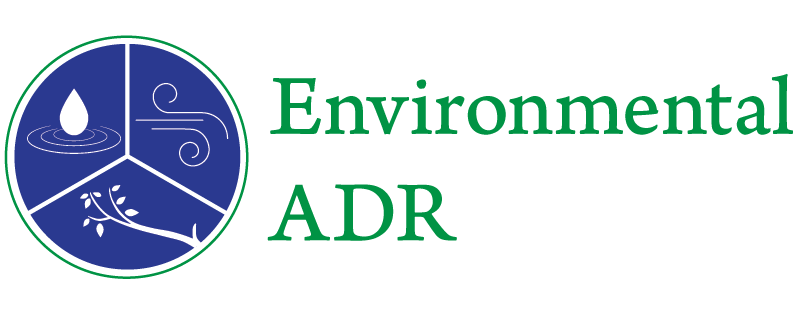
 Call it “rough justice” if you prefer.
Call it “rough justice” if you prefer. I just returned from the annual JAMS owners’ meeting where we were treated to a presentation from Brad Heckman of the NY Peace Institute.
I just returned from the annual JAMS owners’ meeting where we were treated to a presentation from Brad Heckman of the NY Peace Institute. Two recent mediations vie for entry into the pantheon of failed mediations. They both suffered from the similar flaws in which one or more parties appeared with no authority to contribute to a joint financial settlement. Both cases were set up as cost sharing negotiations and were briefed as such . . . or maybe they weren’t . . .
Two recent mediations vie for entry into the pantheon of failed mediations. They both suffered from the similar flaws in which one or more parties appeared with no authority to contribute to a joint financial settlement. Both cases were set up as cost sharing negotiations and were briefed as such . . . or maybe they weren’t . . .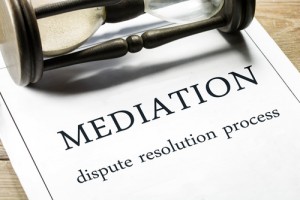 Practitioners in the field of ADR lament that mediation has become increasingly “judicialized” – meaning that it is all too often viewed as just another step on the litigation path toward trial. That was not the prevailing view when I began my mediation practice almost 25 years ago. Mediation was viewed as a uniquely significant settlement opportunity, where the parties came prepared to explore settlement options and to negotiate their way to that end.
Practitioners in the field of ADR lament that mediation has become increasingly “judicialized” – meaning that it is all too often viewed as just another step on the litigation path toward trial. That was not the prevailing view when I began my mediation practice almost 25 years ago. Mediation was viewed as a uniquely significant settlement opportunity, where the parties came prepared to explore settlement options and to negotiate their way to that end.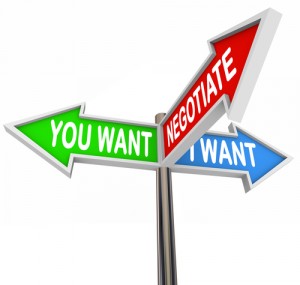
 What Is the Added Value of the Mediator In Getting Cases Settled? It is important to note that mediation is a tool that can help in some but not all cases. Lawyers and clients settle cases everyday without the assistance of a mediator. Clearly, mediation is not warranted in those cases and is not intended to replace what lawyers do well on their own. In fact, most cases reach resolution in this way, and that is a very good thing.
What Is the Added Value of the Mediator In Getting Cases Settled? It is important to note that mediation is a tool that can help in some but not all cases. Lawyers and clients settle cases everyday without the assistance of a mediator. Clearly, mediation is not warranted in those cases and is not intended to replace what lawyers do well on their own. In fact, most cases reach resolution in this way, and that is a very good thing.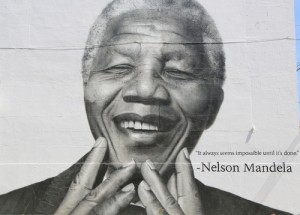 The title of this blog post is a quote from Nelson Mandela who cycled through the entire spectrum of dispute resolution tactics as leader of both peaceful protests and armed resistance against the white minority’s oppressive regime in a racially divided South Africa. He spent nearly three decades in prison for his convictions. In the end, he decided that talking to one’s adversary is the most powerful tool to resolve conflict. His comment was made with respect to resolving the most significant of societal issues, such as upholding human rights, and choosing between war and peace. But I believe it applies to more mundane concerns that are the subject of most lawsuits and other legal conflict as well.
The title of this blog post is a quote from Nelson Mandela who cycled through the entire spectrum of dispute resolution tactics as leader of both peaceful protests and armed resistance against the white minority’s oppressive regime in a racially divided South Africa. He spent nearly three decades in prison for his convictions. In the end, he decided that talking to one’s adversary is the most powerful tool to resolve conflict. His comment was made with respect to resolving the most significant of societal issues, such as upholding human rights, and choosing between war and peace. But I believe it applies to more mundane concerns that are the subject of most lawsuits and other legal conflict as well.

